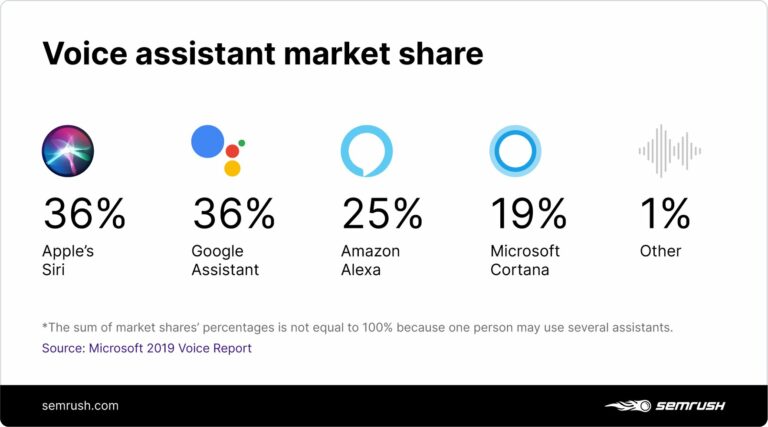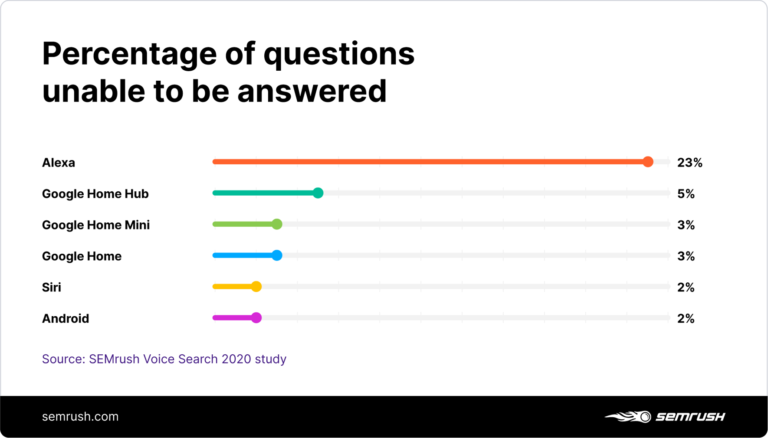As 58% of voice search users employ it to run local business queries, a new study looks at factors that go into ranking the results.
SEMRush published a follow-up to last year’s study on voice search ranking factors, this time with a specific focus on local business searches.
The study aims to provide insight into the algorithms behind various voice assistants – including Apple’s Siri, Google Assistant, and Amazon Alexa.

Given that all voice assistants have comparable market share, SEMRush recommends adapting to all three.
That poses a challenge, however, as all three have drastically different algorithms.
Here are some key insights from the study that marketers can use to optimize local businesses for voice searches.
Local Voice Search Ranking Factors: Key Takeaways
Here’s a quick summary of major findings, with more detailed insights to follow in the next sections.
- The average answer length between all is 23 words –
- Google Assistant returns the longest answers at 41 words.
- Alexa struggled the most with answering questions.
- Businesses can apply “regular” local SEO tactics when optimizing for Google Assistant.
- Optimizing for Siri requires a high Yelp rating and positive customer reviews.
Here’s a breakdown of various key findings for each voice assistant.
Google Assistant Key Findings
All versions of the Google Assistant return different results despite having similar algorithms.
The devices tested in this study include: Google Home, Google Home Mini, Google Home Hub, and an Android phone.
The average answer match between all devices is 22%. The highest answer match (66%) is between the Home Hub and an Android phone.
However, answers are said to be similar across all devices, with only the wording being different.
Google Assistant was able to answer all but 6.3% of questions.
Between all Google devices, results are based on what appears in the local pack in regular SERPs.
That means sites ranking in the local pack are likely to be recommended by Google Assistant in local voice searches.
“In most cases, a voice-activated search for a local place to buy, eat or get some service, returns results from a Local Pack listing.
The key advice for SEOs looking to optimize for visibility and market share across Google Assistant is to optimize for rankings within the Local Pack.”
Results returned by Google Assistant do not seem to be personalized. Assistant returns roughly the same results whether a user is logged in or not.
To optimize for Google Assistant, SEMRush recommends the following:
- Polish up your business’s Google My Business page
- Make use of structured data
- Create content that is simple and easy to understand
Amazon Alexa Key Findings
Alexa has the highest rate of failure when it comes to answering questions.

Alexa takes information from the Bing and employs both Yelp and Yext data to return answers.
Almost 1 in 4 questions were unable to be answered by Alexa.
Based on this data, SEMRush suggests that Alexa is mainly a home assistant device that is not designed to be a search engine.
As such, SEMRush doesn’t recommend any specific tactics to optimize content for Alexa.
Apple’s Siri Key Takeaways
Siri is able to answer the most questions out of all three voice assistants tested.
Only 2% of questions went unanswered by Siri.
Siri relies on Yelp when returning results that indicate a place. So improving Yelp ratings and reviews is key to being recommended by Siri.
“Having a 4.5/5 Yelp rating with the biggest number of reviews will turn any business into the most popular local spot in Siri’s eyes.”
SEMRush discovered four main factors that influence Siri’s answers (listed in order of importance):
- Distance
- Number of reviews in Yelp
- Star rating in Yelp
- Prices
Siri pays less attention to the total number of reviews and prioritizes the overall star rating.
That means a business with few reviews and a 5-star rating can win over a business with dozens of reviews and a 4.5 star rating.
Interestingly, Siri will not recommend visiting an Apple Store when asking where to buy apple products. It will simply direct people to Apple.com.
To optimize for Siri, SEMRush recommends the following:
- Consistently work on generating new high-star reviews on Yelp.
- Optimize your Yelp listings with:
- Detailed information
- Choosing the most relevant category to be listed in
- Add as many photos as you can
- Write content for the Yelp page with targeted keywords
- Keep the listing regularly updated
- Respond to customer reviews
For more information on local voice search ranking factors, see the fully study here.

![2020 Local Voice Search Ranking Factors [STUDY]](https://www.searchenginejournal.com/wp-content/uploads/2020/08/11d08f6c-cbb3-4ba2-be2d-3d17a836c58b-5f4da404c5186.jpeg)



![AI Overviews: We Reverse-Engineered Them So You Don't Have To [+ What You Need To Do Next]](https://www.searchenginejournal.com/wp-content/uploads/2025/04/sidebar1x-455.png)